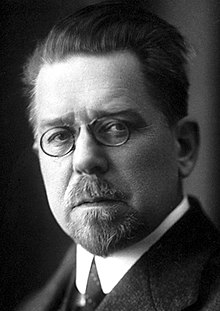Wladyslaw Reymont
| Władysław Reymont | |
|---|---|
 |
|
| Born | Stanisław Władysław Rejment 7 May 1867 Kobiele Wielkie, Petrokov Governorate, Congress Poland |
| Died | 5 December 1925 (aged 58) Warsaw, Poland |
| Nationality | Polish |
| Period | 1896–1924 |
| Genre | Realism |
| Literary movement | Young Poland |
| Notable awards | |
|
|
|
| Signature |  |
Nobel Prize in Literature
1924
Władysław Stanisław Reymont ([vwaˈdɨswaf staˈɲiswaf ˈɾɛjmɔnt], born Rejment; 7 May 1867 – 5 December 1925) was a Polish novelist and the 1924 laureate of the Nobel Prize in Literature. His best-known work is the award-winning four-volume novel Chłopi (The Peasants).
Reymont's baptism certificate gives his birth name as Stanisław Władysław Rejment. The change of surname from "Rejment" to "Reymont" was made by the author himself during his publishing debut, as it was supposed to protect him, in the Russian part of Poland, from any potential trouble for having already published in Galicia a work not allowed under the Tsar's censorship. Kazimierz Wyka, an enthusiast of Reymont's work, believes that the alteration could also have been intended to remove any association with the word rejmentować, which in some local Polish dialects means "to swear".
Reymont was born in the village of Kobiele Wielkie, near Radomsko, as one of the nine children of Józef Rejment, an organist. His mother, Antonina Kupczyńska, had a talent for story-telling. She descended from the impoverished Polish nobility from the Kraków region. Reymont spent his childhood in Tuszyn, near Łódź, to which his father had moved to work at a richer church parish. Reymont was defiantly stubborn; after a few years of education in the local school, he was sent by his father to Warsaw into the care of his eldest sister and her husband to teach him his vocation. In 1885, after passing his examinations and presenting "a tail-coat, well-made", he was given the title of journeyman tailor, his only formal certificate of education.
To his family's annoyance, Reymont did not work a single day as a tailor. Instead, he first ran away to work in a travelling provincial theatre and then returned in the summer to Warsaw for the "garden theatres". Without a penny to his name, he then returned to Tuszyn after a year, and, thanks to his father's connections, he took up employment as a gateman at a railway crossing near Koluszki for 16 rubles a month. He ran away twice more: in 1888 to Paris and London as a medium with a German spiritualist and then again to join a theatre troupe. After his lack of success (he was not a talented actor), he returned home again. Reymont also stayed for a time in Krosnowa near Lipce and for a time considered joining the Pauline Order in . He also lived in Kołaczkowo, where he bought a mansion.
...
Wikipedia
